| Srl | Item |
| 1 |
ID:
079232
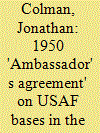

|
|
|
|
|
| Publication |
2007.
|
| Summary/Abstract |
The article explores the 1950 'Ambassador's Agreement' (named after US Ambassador Lewis Douglas) about establishing long-term US air bases in the UK. During the discussions British representatives expressed resentment of American pressure and were concerned about the expense that developing the bases for American purposes might entail. There were even fears that Washington might use the airfields to launch an atomic bomb attack on the USSR without regard to the views of the UK government. The British consented to providing the bases because they wanted to enmesh the US further in UK and Western European defence. For their part American negotiators had wanted to further US atomic strategy without delay. Although the agreement imposed no restriction on the use of the airfields, some US officials believed that in a crisis the UK government might try to prevent them being used for atomic bombing missions.
|
|
|
|
|
|
|
|
|
|
|
|
|
|
|
|
| 2 |
ID:
079234
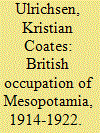

|
|
|
|
|
| Publication |
2007.
|
| Summary/Abstract |
During World War I the military campaign in Mesopotamia placed enormous demands on local man- and animal power to provide the logistical resources vital to its conduct. This required the British civil and military authorities to construct a wartime state apparatus that filled the administrative vacuum left by the retreating Ottomans and made possible its downward penetration and mobilisation of local resources for the war effort. This article examines the interaction of politics and logistics in Mesopotamia and views the enhanced wartime levels of resource extraction in light of the British attempts to codify their presence in the country after 1918 and the nationalist backlash that resulted.
|
|
|
|
|
|
|
|
|
|
|
|
|
|
|
|
| 3 |
ID:
079230
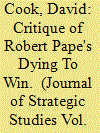

|
|
|
|
|
| Publication |
2007.
|
| Summary/Abstract |
Robert Pape's recent book Dying to Win is one of the most important statistical studies of the global phenomenon of suicide attacks to appear in the recent past. While Pape's basic thesis of the formula of occupation in addition to religious/cultural differences between the occupier and the occupied causing these suicide attacks holds up, there are a number of cases in which it does not. Additionally, some of Pape's historical and Islamic examples are weak. Before proceeding to an over-arching theory of suicide attacks it is important not to ignore the exceptions to Pape's theory.
|
|
|
|
|
|
|
|
|
|
|
|
|
|
|
|
| 4 |
ID:
079229
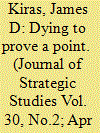

|
|
|
|
|
| Publication |
2007.
|
| Summary/Abstract |
Dying to Win is one of the most important works on suicide terrorism. It purports to unravel the strategic, social, and individual logic that gives suicide terrorism its coercive value. The methodology that Pape uses to support his various assertions is problematic for three reasons. First, he defines his key terms in such a way as to artificially set suicide terrorism apart from other forms of political violence. Second, in a number of cases Pape selects data from single sources to support particular assertions when other sources of data, used together, could provide more rigorous and useful insights into the phenomenon of suicide bombing. Finally, Pape codes his data on suicide attacks according to a loose set of criteria which, if recoded, calls into question some of his broader conclusions about the strategic utility of suicide terrorism campaigns.
|
|
|
|
|
|
|
|
|
|
|
|
|
|
|
|
| 5 |
ID:
079233
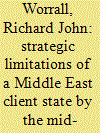

|
|
|
|
|
| Publication |
2007.
|
| Summary/Abstract |
This article looks at how Libya - a British client state under the Anglo-Libyan treaty - refused to allow Britain the use of forces and bases in that country for operations against Egypt during the summer and autumn of 1956. The subsequent restrictions over the use of Libya was shown over the movement of the 10th Armoured Division for 'training exercises' on the Cyrenaican-Egyptian border during early August and later manifested in a written request that the bases would not be used in connection with the operations in Egypt. What emerges is that the decision of the British government to acquiesce to this Libyan demand on 1 November 1956 was taken against the prospect of a 'second front' being opened up in Libya in which urban fighting there would take place there alongside the main operation against Egypt.
|
|
|
|
|
|
|
|
|
|
|
|
|
|
|
|
| 6 |
ID:
079231
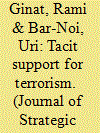

|
|
|
|
|
| Publication |
2007.
|
| Summary/Abstract |
This article demonstrates the inconsistent and wavering Soviet attitude towards national liberation movements in general and the Palestinian organizations in particular. Until the late 1960s, the Soviets viewed these organizations with suspicion, hesitating to engage in political dialogue with them. However, in the 1970s, political and military events in the region, as well as modifications in the Kremlin's Cold War strategies, led to a general shift towards the Middle East in Soviet foreign policy. Soviet leaders showed increased willingness to provide certain Palestinian organizations with arms with which to conduct terrorist activities against Israeli, pro-Israeli, Jewish and Western targets. The article explores the complex relations between Palestinian organizations and the USSR in the field of international terror. The study also exposes and analyzes the nature and content of Soviet-Palestinian arms dialogues and transactions. It provides clear evidence that Soviet policymakers and other luminaries were fully informed of, and sometimes directly involved in, these transactions and dialogues at the highest levels
|
|
|
|
|
|
|
|
|
|
|
|
|
|
|
|
| 7 |
ID:
079228


|
|
|
|
|
| Publication |
2007.
|
| Summary/Abstract |
This article discusses what it is that makes some soldiers overcome the challenges and suffering of combat to such an extent as to master rather than being overcome by it. It adds insights to the combat motivation literature emphasising the properties of combat while presenting a theoretical definition of the difference between soldiers and warriors. The implications of the existence of warriors for organising, recruitment, selection, motivation, leadership and training, equality, cost and employment are discussed, and it is found that there are two basic ways of organising warriors, the most prevalent being into Special Operations Forces. The paper concludes with reflections on the circumstances in which even warriors refuse to fight.
|
|
|
|
|
|
|
|
|
|
|
|
|
|
|
|